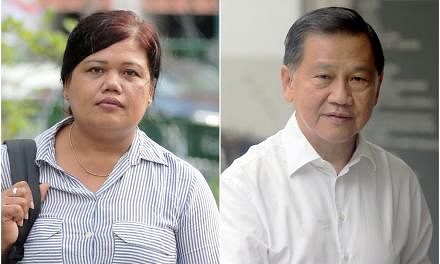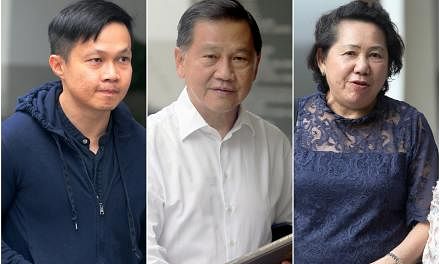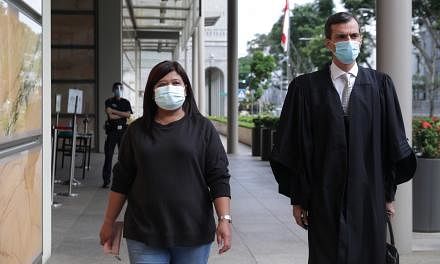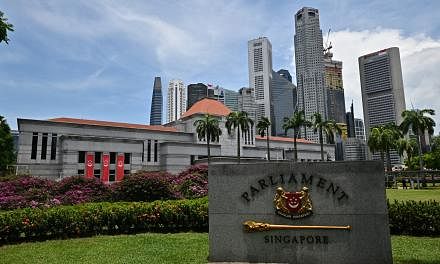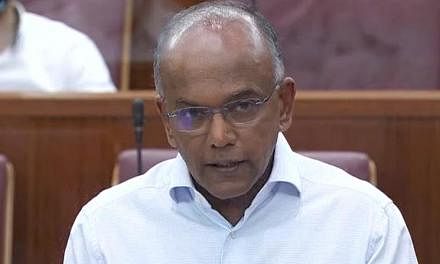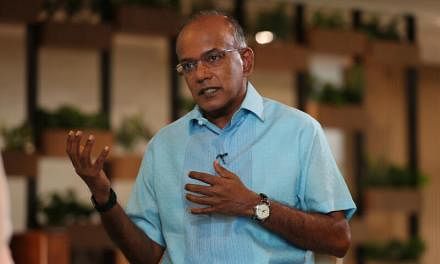SINGAPORE - A foreign domestic worker was charged and found guilty of theft in Singapore and the complainant was a wealthy, powerful person, but the maid was later acquitted by the High Court on appeal.
This shows that everyone is equal before the law and it does not matter who they are, said Home Affairs and Law Minister K. Shanmugam as he gave a detailed account of the series of events in Ms Parti Liyani's case, which sparked debate about the fairness of the justice system.
Speaking in Parliament on Wednesday (Nov 4), Mr Shanmugam said the case illustrates how the rule of law functions in Singapore.
He said: "We may agree or disagree with the court's conclusions. But this is a different matter... This case shows that the criminal justice system as a whole works."
He was making a ministerial statement on the case involving Ms Parti, who the High Court on Sept 4 acquitted of theft, and then Changi Airport Group chairman Liew Mun Leong and his family. The case sparked an uproar, with MPs and others raising questions about the criminal justice system.
Mr Shanmugam said there is a sense in many societies that the elite have bent the rules to their own advantage and, in the process, "suborned those in government".
However, this is not the case in Singapore, he added, and it is all the more critical to protect the integrity of the system that has been built up over the years.
He said: "We must jealously guard the availability of equal opportunities. We must ensure that everyone has a fair shake. We must be alert, guard against the wealthy and the powerful taking unfair advantages.
"If Liew Mun Leong did unfairly influence the proceedings, then it will be a hit to our foundations. It will hit our sense of fairness, equality, justice. A dent to Project Singapore itself because Singapore is built on these ideals."
And while Singapore has always guarded against the corrosion of its justice system, this does not mean that there will be no abuse of power or corruption, said Mr Shanmugam.
When it happens, there must be swift, decisive actions to punish those responsible and stamp out such behaviour, and successive governments have been very clear about this position, he added.
The arrest of Teh Cheang Wan - who was minister for National Development between 1979 and 1986 - for corruption was a prime example of the Government's "ruthless intensity in upholding integrity," said Mr Shanmugam.
He added that Mr Teh was described by then Prime Minister Lee Kuan Yew as "a man of considerable ability", and he had played a key role in getting the Government to deliver on its promise to build enough flats for people in the country's early days.
Yet, despite Mr Teh's seniority and the public praise he got, when corruption allegations surfaced, Mr Lee directed the Corrupt Practices Investigation Bureau to investigate, said Mr Shanmugam.
"Mr Lee Kuan Yew set the tone... He said at the time: 'There is no way a minister can avoid investigations and a trial, if there is evidence to support one'."
The values of Singapore's founding generation of leaders have been scrupulously adhered to by successive generations of leaders and are like "religious commandments", he added.
Mr Shanmugam said under Prime Minister Lee Hsien Loong, many high-ranking officials who have erred have likewise been punished, like former Singapore Civil Defence Force commissioner Peter Lim, who was jailed for six months in 2012 and dismissed from the public service for corruption.
Another civil servant, Mr Edwin Yeo, who was an assistant director at CPIB, was jailed for 10 years for misappropriating about $1.7 million, Mr Shanmugam added.
He also cited former National Kidney Foundation chief executive T. T. Durai, who was jailed three months for corruption, and former executive director of the Singapore Environment Council Howard Shaw, who was jailed for 12 weeks for paid sex with a minor.
Said Mr Shanmugam: "The message is: It doesn't matter who you are. If you do wrong, action will be taken."




